Vs
Meet the woman who wants to be the first Somali-American on Lewiston’s City Council.
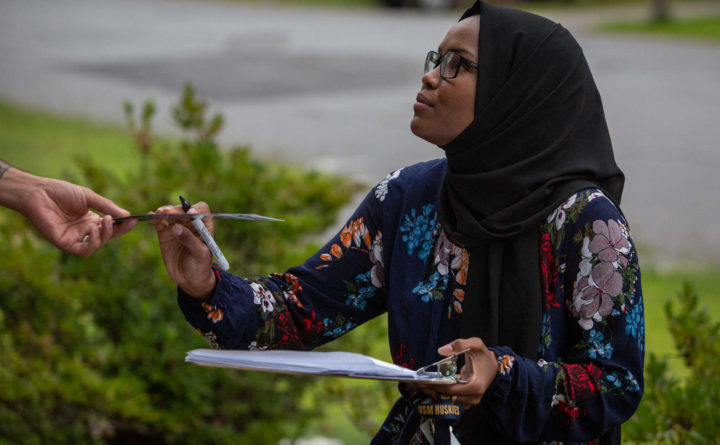
Safiya Khalid, 23, speaks with a resident in the Michaud Meadows subdivision in Lewiston in August. Khalid was going door-to-door, introducing herself to voters. She's running for City Council.
LEWISTON, Maine — Safiya Khalid had already worked a full eight hours at her day job before she started knocking on doors in Lewiston’s Michaud Meadows subdivision. The late summer light was fading fast, and the overcast sky threatened rain.
Khalid was tired and had no umbrella — but she didn’t stop. She wants to be the first person from the city’s Somali community elected to public office. To that end, Khalid was out to meet every unenrolled and Democratic voter in the city’s first ward before Election Day. That’s roughly 800 people. She found 300 as of Aug. 28, with 500 more to go.
Pressing on, she rang another doorbell.
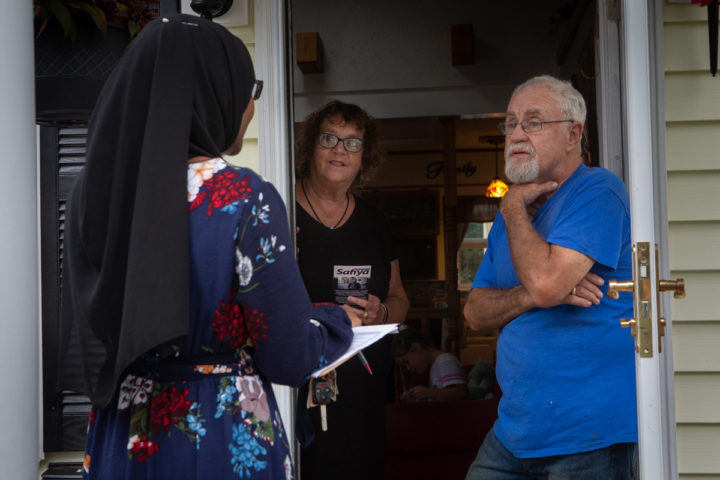
Linda and Norman Houle talk with Safiya Khalid on the front steps of their house in the Michaud Meadows subdivision in Lewiston in August.
“Hi. I’m Safiya,” Khalid said to the older, white man answering the door. “I’m running for City Council, and I just wanted to introduce myself.”
The man, Norman Houle, was surprised to see her. Khalid is just over 5 feet tall. She’s young — 23-years-old — Somali-American and wears a traditional headscarf. Her wispy accent hints that she probably wasn’t born in Maine.
At first, Houle just looked at her. The sound of the nightly television news wafted out of the house behind him. Khalid handed him a flier reading, “Safiya for council.”
She said again, “I’m running for City Council.” Her face was bright and open.
Houle looked at her, then the flier, then back at her. His face then melted into a broad grin.
“Oh,” Houle said. “Good for you.”
He called his wife, Linda, out to meet Khalid. A friendly conversation began. Soon, Khalid was introduced to their granddaughter and an enormous house cat. They chatted about public schools, roads and taxes. By the time Khalid headed for the next house, the Houles had promised to vote for her and agreed to a lawn sign.
Walking down the street, Khalid bent over her clipboard. Her Sharpie marker made a squeaking scratch sound as she crossed another name off her list. Only 499 to go.
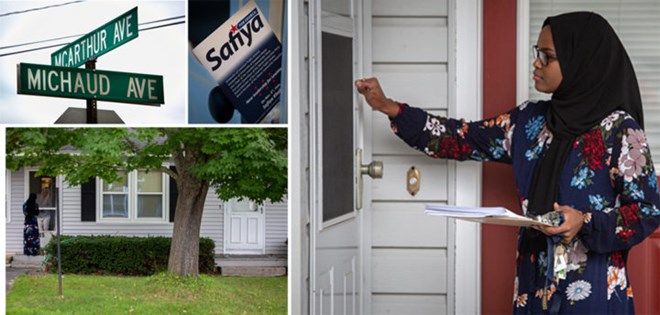
Safiya Khalid, 23, knocks on doors, introducing herself to voters in the Michaud Meadows subdivision in Lewiston in August. Khalid is running for city council.Troy R. Bennett | BDN
‘That’s when it all started for me’
Khalid’s political life began in 2017 when she ran for school committee. She was 20 years old and a senior psychology student at the University of Southern Maine.
“I lost that race, but that’s when it all started for me,” Khalid said, sitting in a coffee shop after canvassing until after dark.
She was motivated by what she saw as a lack of diversity in Lewiston city government at the time. She watched the city get progressively more diverse — especially the public school system — while government stayed mostly the same: older and white.
“There wasn’t any representation on any committee, on any level, in any position of power, from the immigrant community,” Khalid said. “Their voices weren’t heard.”
Another Somali immigrant, Zam Zam Mohamud, has twice been appointed to the Lewiston School Committee, filling vacant seats. Mohamud was not currently serving on the committee in 2017 when Khalid ran.
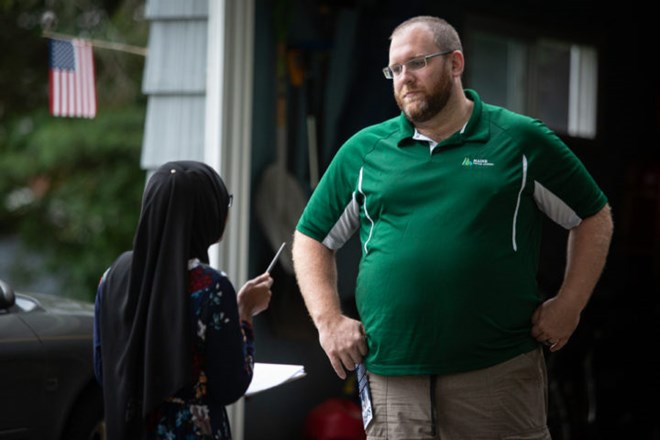
Safiya Khalid, 23, speaks with Michael Suci in the Michaud Meadows subdivision in Lewiston in August.Troy R. Bennett | BDN
After losing her school board bid, Khalid dug in deeper. She received political training through Emerge Maine, which helps Democratic women who want to run for office. Today, she’s vice chair of the party’s Lewiston chapter and has an executive seat on the state committee.
“I’ve just poked my head in places and gotten involved. Here I am, two years later, running again,” Khalid said.
This time, she wants to represent Lewiston’s first ward on the City Council. If elected she would be the first member of the city’s recent immigrant population to win a municipal election.
Khalid also wants to be the voice of young people in a state known for being old. She pointed out that Androscoggin County — where Lewiston is the biggest city — is the youngest county in the state. According to the U.S. Census Bureau, 21.7 percent of residents are under 18.
“We need to invest in our young people. They need attraction, a vibrant community where they can work and live,” Khalid said. “We need nice apartment buildings, a nice downtown community. We have a lot of challenges we are facing. That’s why I get up every day and go knock on another door.”
Specifically, Khalid wants Lewiston code officials to regularly inspect every rental unit in the city instead of waiting until a tenant files a formal complaint. She thinks it would ensure that renters live in safe, lead paint-free homes while also helping landlords keep up on regular maintenance.
Lewiston is currently eyeing a $30 million housing grant from the federal government. If that doesn’t come through, Khalid would look at other ways to develop new housing.
“The city or state should explore offering low interest or no interest loans to homeowners who want to fix their property,” Khalid said, “and we should be working to find ways to encourage owner-occupancy.”
Khalid also pointed out that Lewiston’s housing challenges affect everyone, recent immigrants and established residents alike.
“I think we’re struggling the same way across the city,” Khalid said. “The key is to recognize we have the same issues, and that we should come to an understanding as how to solve and face our challenges as a coalition.”
The Ward 1 seat is currently held by Jim Lysen, who is not running for re-election. Linda Scott was initially running against Khalid but dropped out. She was replaced by Walter Hill. He did not answer the phone or respond to emailed questions.
‘Where I learned to write my name’
Khalid was born in Somalia but grew up in downtown Lewiston. She said there is no question about it, Lewiston is her home, and it’s not by accident.
Her memories of Somalia are only dim shadows. Khalid remembers being sick in a large refugee camp and not much else.
More clearly, she recalls arriving in the United States in 2006 with her mother and two younger brothers. The family was placed in an apartment in Elizabeth, New Jersey. They knew no one and spoke no English. Their social worker filled their refrigerator with pork, a food forbidden by their religion. The family was isolated and unhappy.
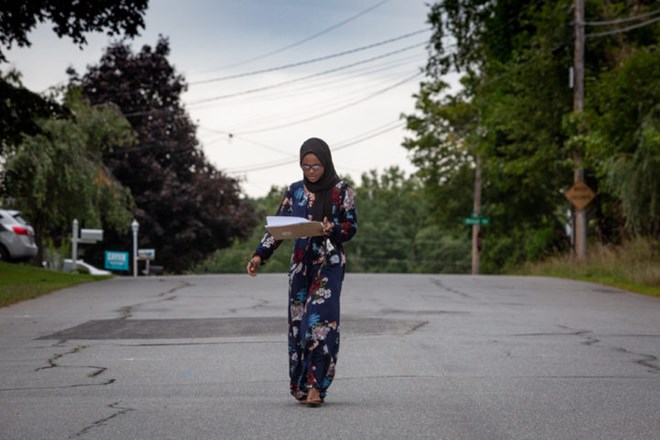
afiya Khalid, 23, looks at her list of unenrolled and Democratic voters while canvasing in Lewiston in August. Khalid wants to be the first Somali-American elected to the city council.Troy R. Bennett | BDN
Edited Version
Read the rest on;
https://bangordailynews.com/2019/10...st-somali-american-on-lewistons-city-council/





